Why are CMOs investing in Data Management Platforms?

Ever wondered how companies seem to know your tastes so well? That’s the magic of a data management platform (DMP).
Think of it as a giant hub that collects info from various places—online, offline, even your phone. This platform crafts detailed customer profiles, acting like a guide for companies navigating through advertising and personalization.
What Is A Data Management Platform?
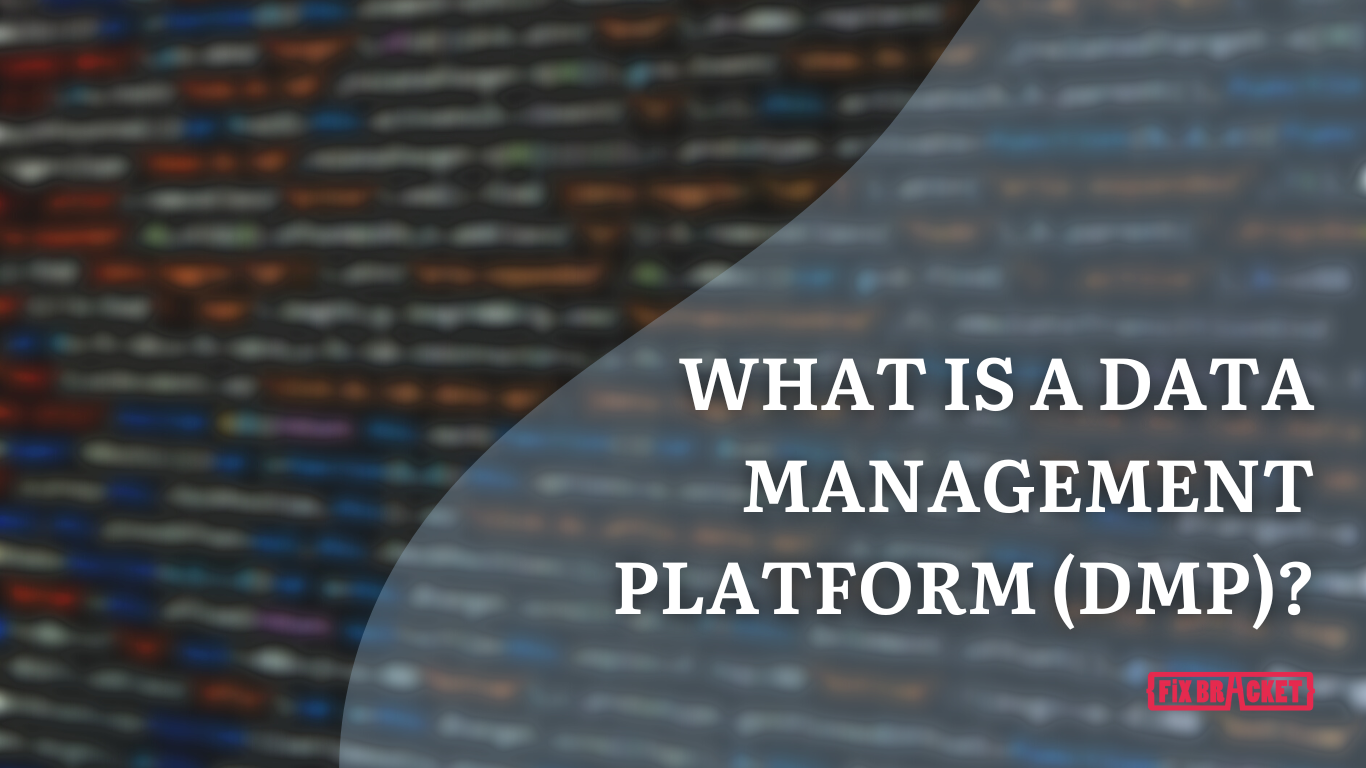
Imagine a DMP as a secret base for superheroes, gathering and sorting heaps of data from different sources. It’s incredibly vital for digital marketing, granting companies a deep understanding of their customers.
Whether it’s your website clicks or the things you buy, a DMP puts these pieces together, like solving a massive puzzle to reveal the whole picture.
Discover the wizardry behind how companies understand your preferences! Dive into the world of Data Management Platforms (DMPs), the secret sauce behind tailored ads and personalized experiences.
How Does A Data Management Platform (DMP) Work?
Technology today helps companies get to know their customers in a super detailed way. They look at different kinds of info—like who their customers are and how they behave—to group them into specific audiences.
Have you ever checked out something online and then seen ads for it everywhere you go online? That’s the data management platform (DMP) doing its thing. Now, let’s find out how it works:
Imagine a data management platform (DMP) as a powerhouse that knows exactly what fans love. It’s like having a sports encyclopedia that gathers insights from various sources—online interactions, purchases, and even event attendance.
This DMP creates fan profiles, enabling targeted promotions and tailored content.
For instance, within the DMP, there are segments like “avid basketball fans.” If someone frequently visits basketball forums, watches live games online, or shops for sports merchandise, the DMP might classify them as an “avid basketball fan.”
Just as every website uses tracking codes to monitor visitors, this DMP follows the fan’s journey across different sports-related sites, providing a comprehensive view of their interests.
Uses of this DMP data
Using this information, marketers can create clusters of fans who share similar interests—such as those following specific teams or regularly attending sports events. These clusters receive tailored promotions, ensuring they get content aligned with their sports passions.
Once the DMP gathers this data, it crafts anonymous profiles for each fan. These profiles are then shared with advertising platforms and sports-related channels, allowing them to offer personalized experiences.
However, it’s crucial to note that while the DMP collects personal data, it safeguards this information, ensuring marketers never access personal details like names or addresses. Instead, they receive aggregated insights for targeted marketing without compromising individual privacy.
Simplifying Why A Data Management Platform (DMP) Matters
Businesses often turn to a data management platform (DMP) primarily associated with aiding marketers, publishers, and ad agencies.
Originally used to convert both offline and online data, such as sales records, CRM systems, web analytics, and mobile data, into actionable insights for advertising placements, DMPs have expanded their roles.
With the rise of data protection systems and the widespread use of big data in various industries, DMP capabilities now extend beyond marketing. They assist in managing and analyzing data across systems, enabling better decision-making and activation of data insights.
In marketing, DMPs empower businesses by consolidating customer data from diverse sources. They then organize and segment this information based on factors like location, income, online behavior, and past purchases.
Advanced algorithms within DMPs utilize this segmented data to identify potential customers resembling existing clientele, facilitating targeted marketing campaigns.
These platforms play a crucial role in tailoring marketing strategies and assessing campaign performance across different customer segments and advertising channels.
A data management platform that transforms vast data sets into actionable insights. It grants businesses a deeper understanding of their customers, guiding data-informed decisions regarding media purchases, campaign targeting, and advertising enhancements.
From Gathering Data to Making A Data Management Platform (DMP) Work
After gathering first-party data, it gets sorted into segments or categories known as a “hierarchy”, tailored to suit different business models.
For instance, a large publisher network might categorize it based on their websites, while agencies might have separate accounts for each client.
This organized data enables a comprehensive understanding of the audience, aiding in various aspects like crafting effective proposals, enriching audience insights, and expanding audience reach for campaigns.
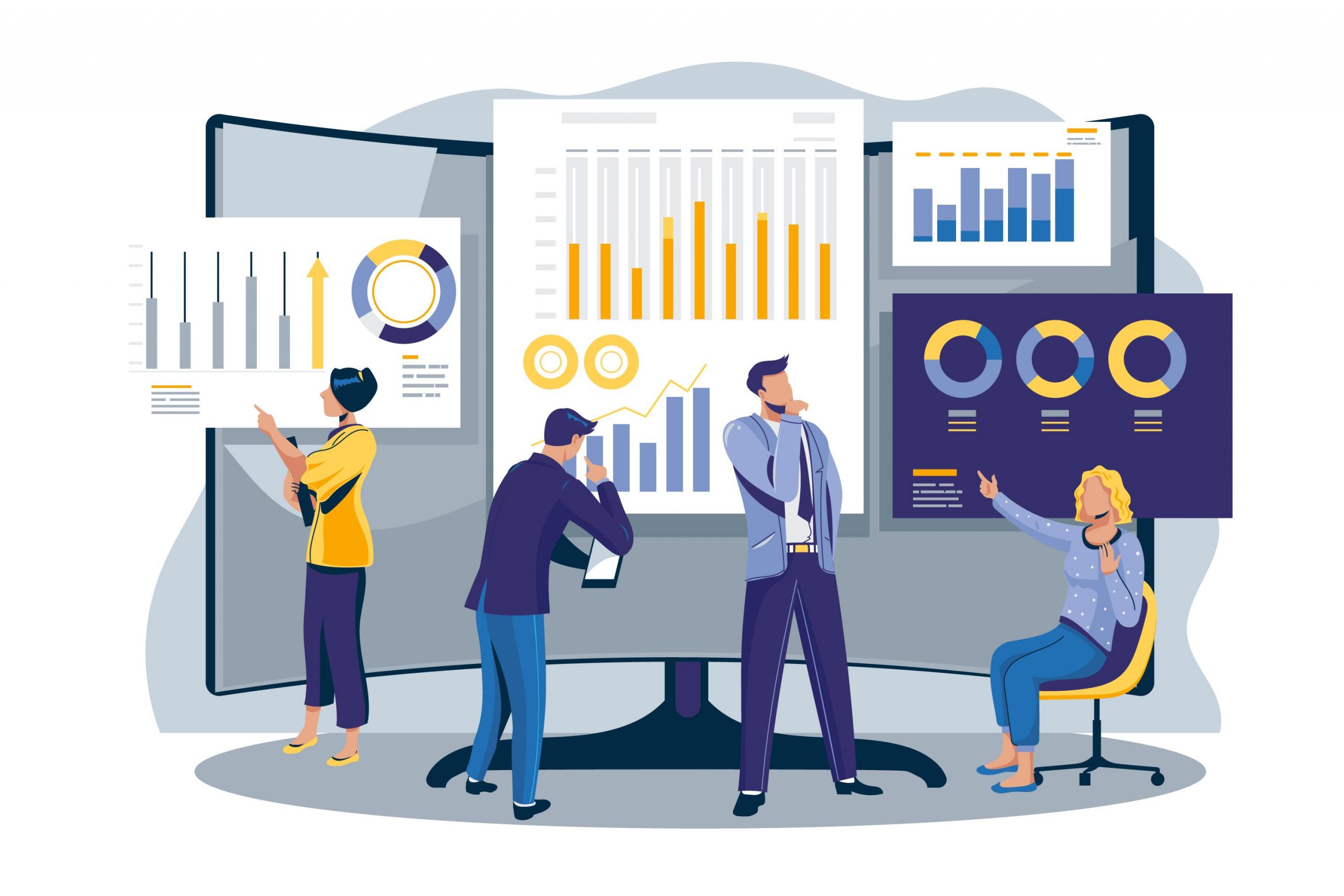
Gathering Data & Making DMPs Work
The process of starting with a DMP involves four fundamental steps:
- Organization:
A DMP arranges your first-party data based on categories and taxonomies defined by your specific needs. It requires a clear understanding of your data requirements before implementation. - Segmentation and Audience Creation:
Once data is organized, it allows the creation of audiences tailored for specific marketing campaigns. Segmentation empowers marketers, publishers, and advertisers to target the right consumers with data-driven strategies. - Insights and Audience Profiling:
Following data organization, analysis provides insights into customer patterns, trends, and intentions. Audience Profile Reports furnish detailed characteristics and interests of each audience, guiding future creative and messaging approaches. - Activation:
The final step involves activating this data—putting it to use! The DMP’s integrations with other platforms enable seamless transport of audiences to DSPs, SSPs, and more. This activation can involve targeted campaigns via DSPs or customizing website content for specific audience groups, showcasing the versatility of a DMP in data utilization.
Benefits of Using A Data Management Platform (DMP)
In today’s data-driven business landscape, the ability to harness and leverage vast amounts of information is a strategic advantage. A Data Management Platform (DMP) serves as a pivotal tool, enabling organizations to consolidate, analyze, and utilize diverse data sources for informed decision-making.
Here are the key benefits that businesses derive from employing a data management platform (DMP):
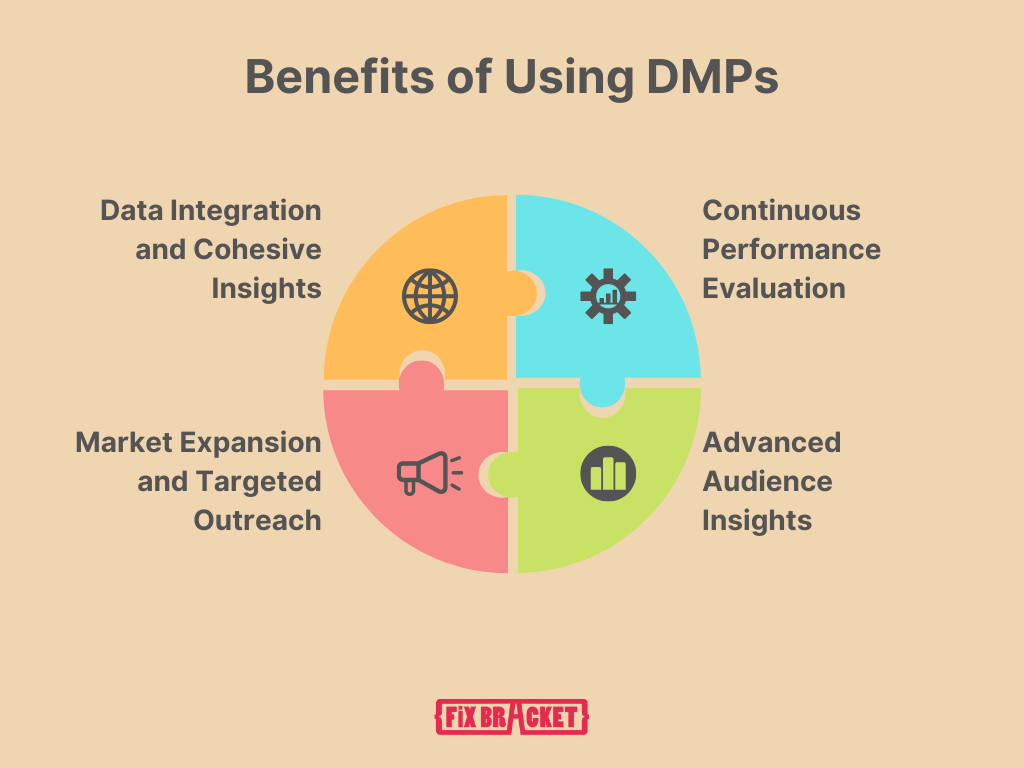
1. Data Integration and Cohesive Insights:
DMPs unify data from diverse sources, granting companies a comprehensive view of customers. This consolidation fuels data-driven strategies by breaking down informational silos.
2. Market Expansion and Targeted Outreach:
Leveraging second and third-party data, DMPs enable access to varied global markets. These platforms facilitate audience extension, aiding in the identification and targeting of new customer segments based on interests, demographics, and buying intent.
3. Continuous Performance Evaluation:
DMPs provide ongoing, real-time insights for long-term strategies. They allow continuous assessment of campaigns and strategies, distinguishing successful approaches from those needing improvement. This fosters consistent evaluation and adaptation to meet evolving market and consumer needs.
4. Advanced Audience Insights:
Through sophisticated analytics and machine learning, DMPs extract valuable audience insights. These platforms analyze user data comprehensively, generating a holistic customer view. This wealth of information helps in crafting tailored campaigns and relevant messages, enriching customer relationships and CRM systems.
Who Can Benefit From Using a Data Management Platform or DMP?
A Data Management Platform (DMP) isn’t limited to specific industries—it’s a versatile tool beneficial to professionals and businesses globally.
Executives at the helm of organizations utilize DMPs for informed decision-making, while IT experts rely on them for seamless system operation and maintenance.
Publishers use Data Management Platforms (DMPs) to optimize ad strategies by refining audience data from websites. Integrating DMPs enhances first-party data, boosting CPMs and revenue streams. These platforms elevate the precision of data-driven campaigns, giving publishers a competitive edge.
Marketers leverage DMPs for comprehensive audience insights, identifying prospects akin to high-value customers. With detailed data, they execute impactful, cross-device campaigns, maximizing audience engagement and campaign success rates.
Agencies utilize DMPs for deeper audience understanding, tailoring targeted solutions for clients. Insights from DMPs empower agencies to optimize campaigns, boosting client ROI and providing strategic advantages.
IT Experts ensure seamless DMP integration, maintaining data security and compliance. They optimize system performance for efficient data management, ensuring stable functionality for all stakeholders.
Personalized Marketing Made Easy with a DMP
Having grasped the essence of a Data Management Platform (DMP), the next step is integrating it seamlessly into your marketing strategy without any significant adjustments.
Once your DMP begins gathering data, you can profile your current customers and audience, derive insights from the data, and refine campaigns to enhance marketing performance significantly.
The data management platform (DMP) serves as the heart of your marketing operations, enabling a deeper understanding of your audience’s preferences. It aids in identifying the most effective advertising and marketing materials, the content that resonates best with your customers, and the messaging that motivates them to purchase your products or services.
In essence, leveraging a data management platform (DMP) allows your aspirations of data-driven marketing to materialize, influencing campaigns to achieve greater success.
But what exactly can you do with the wealth of data gathered through a Data Management Platform? Here are a few focal points on what to do with the data.
What exactly to do with the data gathered?
- Targeting and personalized advertising: Tailor your content and visuals to match your audience’s interests and needs.
- Content and product recommendations: Deliver individualized experiences for both web and mobile users.
- TV DMP: Connect with your audience across TV and digital platforms, reaching them at the opportune moment.
- Monetization of data: Generate additional revenue by leveraging your valuable data.
- Audience enrichment: Gain deeper insights into your audience beyond their interactions on your website.
- Audience expansion: Attract new customers to foster brand loyalty.
Utilizing DMP-driven audiences for paid search and social campaigns: Effectively target, suppress, or dynamically update campaigns for enhanced performance.
Ultimately, in e-commerce and marketing, delivering personalized experiences to your customers holds immense importance. Building a rapport with your audience by catering to their interests and needs is key, and leveraging data for personalization is a powerful strategy.
Brands like Amazon use data-driven recommendations to offer customers products similar to their past interests, showcasing the potential of personalization in driving engagement and conversions.
Your data holds immense value, but harnessing it effectively is crucial. A DMP acts as the catalyst, transforming this data into actionable insights, allowing you to reach the right audience, on the right platform, at the optimal time, thus maximizing campaign performance.
Customer Data Platform (CDP) Vs Data Management Platform (DMP)
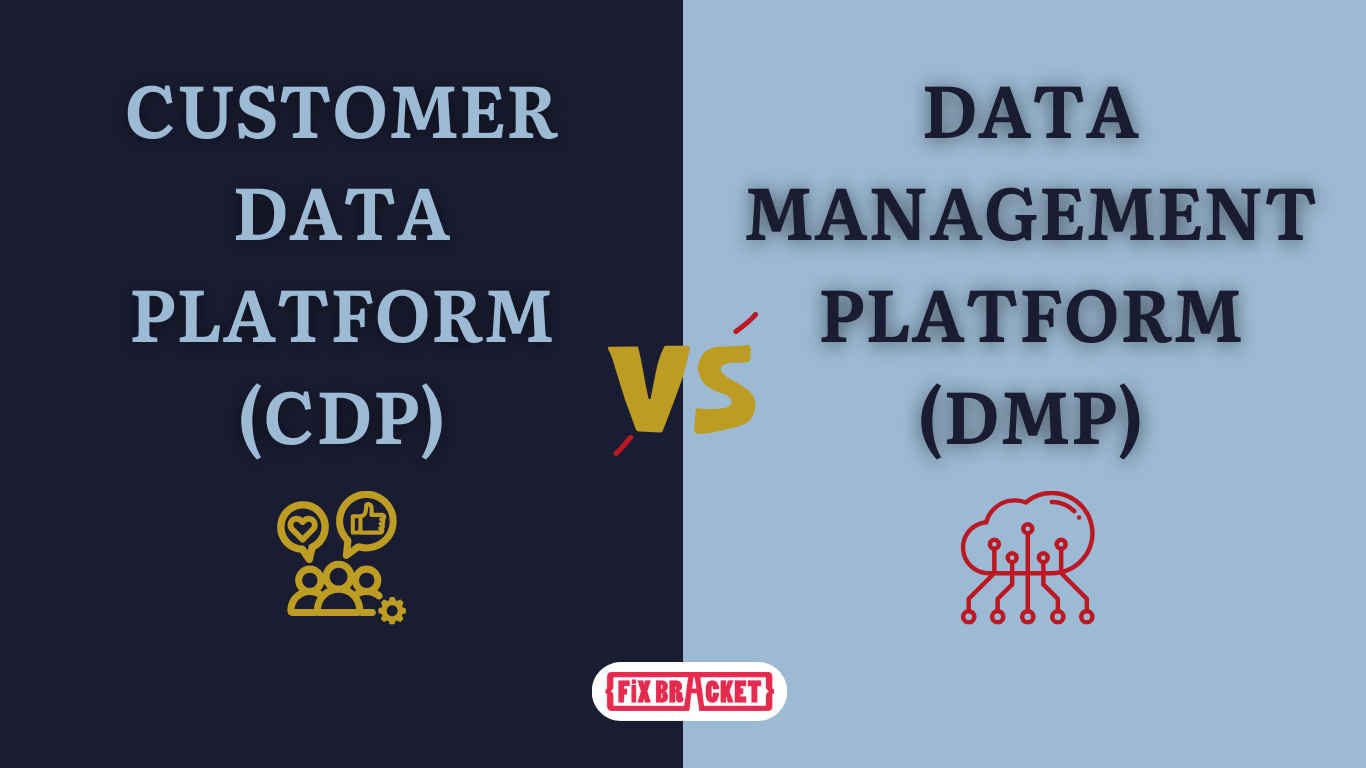
DMP (Data Management Platform):
- Primarily handles third-party data and is used for targeted advertising across various digital channels.
- Its core function is optimizing ad campaigns by segmenting audiences based on their online behavior, preferences, and demographics.
- Commonly utilized by marketers and advertisers to maximize the effectiveness of their campaigns through precise audience targeting.
CDP (Customer Data Platform):
- Specializes in consolidating and unifying first-party customer data from various sources.
- Focuses on creating comprehensive customer profiles to facilitate personalized customer experiences.
- Its primary goal is to understand individual customers, their preferences, and behaviors to improve customer service, drive loyalty, and enhance overall satisfaction.
- Helps businesses tailor interactions across touchpoints, providing a seamless and personalized customer journey.
How To Choose The Right DMP?
When selecting the right Data Management Platform (DMP) for your business, several crucial considerations come into play:
1. Alignment with Business Objectives:
Understanding Your Needs: Evaluate your marketing goals and strategies. Identify how data can enhance your campaigns and customer experiences. Ensure the DMP aligns with these objectives.
Data Integration and Management:
Data Aggregation: Look for a DMP capable of aggregating and unifying various data sources, including first-party, second-party, and compliant third-party data. It should handle both online and offline data effectively.
Data Activation: Assess how the DMP activates collected data. It should offer robust segmentation, audience profiling, and activation capabilities for targeted campaigns.
Scalability and Flexibility:
Future-Proof Solutions: Consider the scalability of the DMP. Ensure it can adapt to the evolving needs of your business and handle increasing data volumes. A flexible platform allows seamless integration with other tools and systems.
Compliance and Privacy:
Adherence to Regulations: Verify that the DMP complies with data privacy regulations and industry standards. Look for features that prioritize data security, user consent management, and adherence to legal requirements.
2. User-Friendly Interface and Support:
Ease of Use: Choose a DMP with an intuitive interface and user-friendly features. It should be easy for your team to navigate and utilize effectively.
Customer Support: Assess the level of customer support and training provided by the DMP vendor. Adequate support ensures smooth onboarding and ongoing usage.
3. Cost-Effectiveness:
Budget Considerations: Evaluate the costs associated with the DMP, including implementation, licensing, and ongoing maintenance. Consider the return on investment (ROI) against the platform’s capabilities.
Ultimately, the right DMP should align with your specific marketing needs, be adaptable to future changes, ensure data compliance and security, offer seamless integration and provide effective support to maximize its potential within your marketing technology stack.
Why SMBs Need A DMP?
A Data Management Platform (DMP) operates as a centralized repository, consolidating campaign and customer data to empower marketing teams with comprehensive insights. It serves as a pivotal tool, enabling marketers to effectively manage and deeply analyze customer information, paving the way for the creation of targeted campaigns that reach the right audience at the opportune moments, ultimately boosting the return on investment (ROI) significantly.
Implementing a DMP brings a myriad of advantages. It facilitates the management of diverse online campaigns across various devices while seamlessly integrating all customer and campaign data, irrespective of its origin, state, or classification.
This integration maximizes the utilization of data assets, enhances segmentation capabilities, and scales marketing initiatives, all while ensuring data integrity and fortifying security measures in partnerships and collaborations.
Moreover, a DMP empowers businesses to optimize marketing campaigns comprehensively, enhancing reach, response rates, and conversion metrics, while also enabling precise control over advertising expenses to augment the overall ROI.
This platform fosters a culture of accountability within marketing and advertising, driving data-informed decisions and strategic planning.
Features of a Data Management Platform (DMP)
Let’s break down the key functionalities offered by a Data Management Platform (DMP) to amplify marketing strategies:
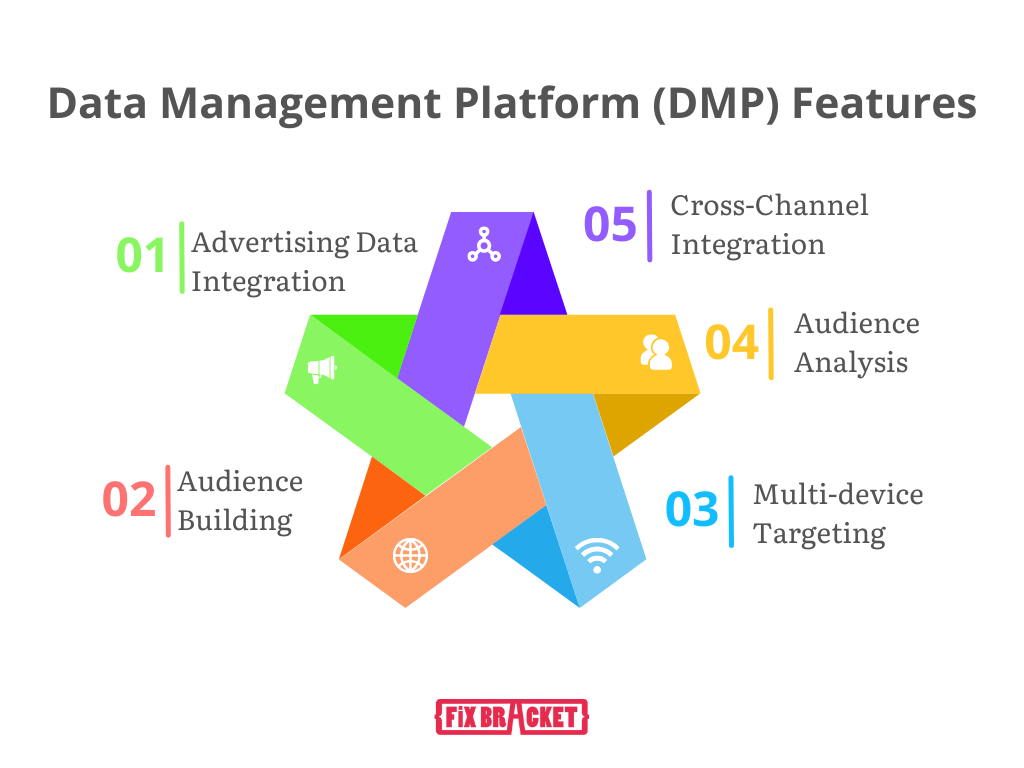
Data Management Platform (DMP) Features
1. Advertising Data Integration: A data management platform (DMP) acts as a centralized hub, amalgamating a plethora of data sources. It adeptly assimilates first-party data from online and offline channels, fostering audience segmentation.
Through data marketplaces, it extends the reach and enriches first-party data with supplementary second and third-party data. The platform also facilitates data monitoring and issue resolution, ensuring a streamlined data ingestion process.
2. Audience Building: Empowered by look-alike modeling, a DMP refines audience targeting and expands prospects by identifying suitable classifications. Employing taxonomy permission tools bolsters second-party data sharing. Insights derived from audience discovery reports aid in discovering new target audiences and optimizing existing ones, fortifying campaign efficacy.
3. Cross-Device Targeting: Ensuring consistent messaging across multiple devices, a DMP broadens audience reach by integrating third-party data across diverse marketing channels. It leverages private ID graphs for enhanced cross-device targeting, extending campaigns seamlessly across the web and social platforms.
4. Audience Analysis: Robust audience analytics form the crux of a DMP’s capabilities. Pre-campaign analytics enable a deeper understanding of target demographics. Post-campaign analyses refine targeting precision and ascertain campaign success, while audience suppression reports aid in excluding converted audiences for optimized targeting.
5. Cross-Channel Integration: An efficient data management platform seamlessly integrates with various marketing channels, allowing marketers to create cohesive, synchronized campaigns across platforms. This ensures consistent messaging and a more impactful brand presence.
These essential features collectively empower marketers to harness data, refine audience targeting, and drive impactful marketing campaigns.
The Future of Data Management Platforms (DMPs)
Advancements in technology are reshaping the landscape of data management platforms. With the rise of IoT applications and affordable sensors, DMPs now contend with a surge in data volumes. Moreover, the integration of machine learning within these systems expedites data transfer from management platforms to their intended destinations.
Looking ahead, the emergence of “fast data” architecture promises swift processing of extensive data volumes.
Simultaneously, data management is evolving to facilitate real-time analysis, allowing businesses to promptly interpret information. Innovative streaming data products are being developed to handle vast and intricate datasets, operating in real-time as data arrives.
Though currently not widely accessible due to cost, these developments foreshadow the future trajectory of data management platforms.
Conclusion
In an era of rapid technological evolution, a data management platform (DMP) stands as the cornerstone of harnessing and leveraging vast data streams.
Their journey unfolds amid the convergence of IoT, machine learning, and the advent of “fast data” architecture, promising instant insights and real-time analytics.
As these platforms evolve to handle larger, more diverse datasets, the future of DMPs holds the potential to revolutionize data processing, enabling businesses to navigate the complexities of modern data ecosystems more efficiently.
People Also Read:
Unlock Your Full Marketing Potential with a Customer Data Platform.
Why Customer Data Platforms are important for creating unified customer profiles?
Account Based Marketing (ABM): The Ultimate 2023 Guide.




